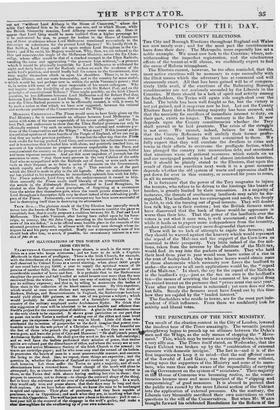■ •■•••■■•••••■••■..........s.
TOPICS OF THE DAY.
THE COUNTY ELECTIONS.
THE City and'Borough Elections throughout England and Wales are now nearly over ; and for the most part the constituencies have done their duty. The Metropolis more especially has set a noble example. We must now look to the Counties; where, not- withstanding the imperfect registration, and the mischievous effects of the tenant-at-will clause, we confidently expect to find the cause of Reform triumphant.
The Electors cannot, however, be too often reminded, that the most active exertions will be necessary to cope succssfully With the illicit means which the adversary has at command and will strenuously exert. All that has been gained will be of compara- tively little avail, if the exertions of the Reforming Borongh constituencies are not zealously seconded by the Liberals in the Counties. If there should be a lack of spirit and activity among the freeholders, the Tories will again ride rough-shod over the land. The battle has been well fought so far, but the victory is not yet gained, and it may even now be lost. Let not the County Electors fancy that a Reforming majority has been secured, and that the necessity for sacrifices of immediate interest to duty, on their part, exists no longer. The contrary is the fact. It now depends upon the County constituencies whether the Tory shall prevail or be laid prostrate. The crisis of the struale is not over. We cannot, indeed, believe for an instant, that the County Reformers will stultify their former pram- sions and votes, and betray the trust committed to them. We fully expect that they will emulate the dwellers in cities and towns in their efforts to overcome the profligate faction, which has plunged the country into measureless debt, and sanctioned that atrocious waste of national resources which entails 01) US and our mortgaged posterity a load of almost intolerable taxation. But it should be plainly stated to the Electors, that upon the result of their own exertions next week it in a great measure depends whether the old system of waste and oppression shall be put down for ever in this country, or renewed for years to come, in all its enormity. It is fortunate that the power of the Tory magnates to injure the tenants, who refuse to be driven to the hustings like beasts of burden, is greatly limited by their necessities. In a majority,of instances, the threats of overbearing landlords may safely be dis- regarded. The landlords are too extravagant and needy, too deeply in debt, to risk the turning out of good tenants. They will doubt- less talk big, as is their custom; but the British farmers must have discovered that the bark of these would-be oppressors is worse than their bite. That the power of the landlords over the voters is not what it once was, is well ascertained; and the fact, while it leads us to cxpect more independence from the tenantry, renders political subserviency more disgraceful than ever. There will be no lack of attempts to cajole the farmers; and they should be warned against the knavery which would represent the repeal of the Malt-tax and the support of the Corn-laws as essential to their prosperity. Very little indeed of the five mil- lions, taken from the revenue by the abolition of the Malt-tax, would find its way into the pockets of tenants. They who hold their laud from year to year would soon have notice of a. rise in the rent of barley-land : they who have leases would obtain none of those abatements which necessity now forces the landlord to make—the answer to all such applications would be, the "repeal of the Malt-tax." In short, the cry for the repeal of the Malt-tax is the landlord's cry,—just as the tax on corn is the landlord's tax—the means of screwing the last remnant of his capital from his ruined tenant on the pretence that "prices must rise next year:' Year after year this promise is reiterated ; yet corn does not rise, but falls. Surely the farmers must have found out by this time how they are cajoled by the "landed interest."
The freeholders who reside in towns, are for the most part inde- pendent of illicit influence. From them we confitlently look for activity and liberal votes.


























 Previous page
Previous page